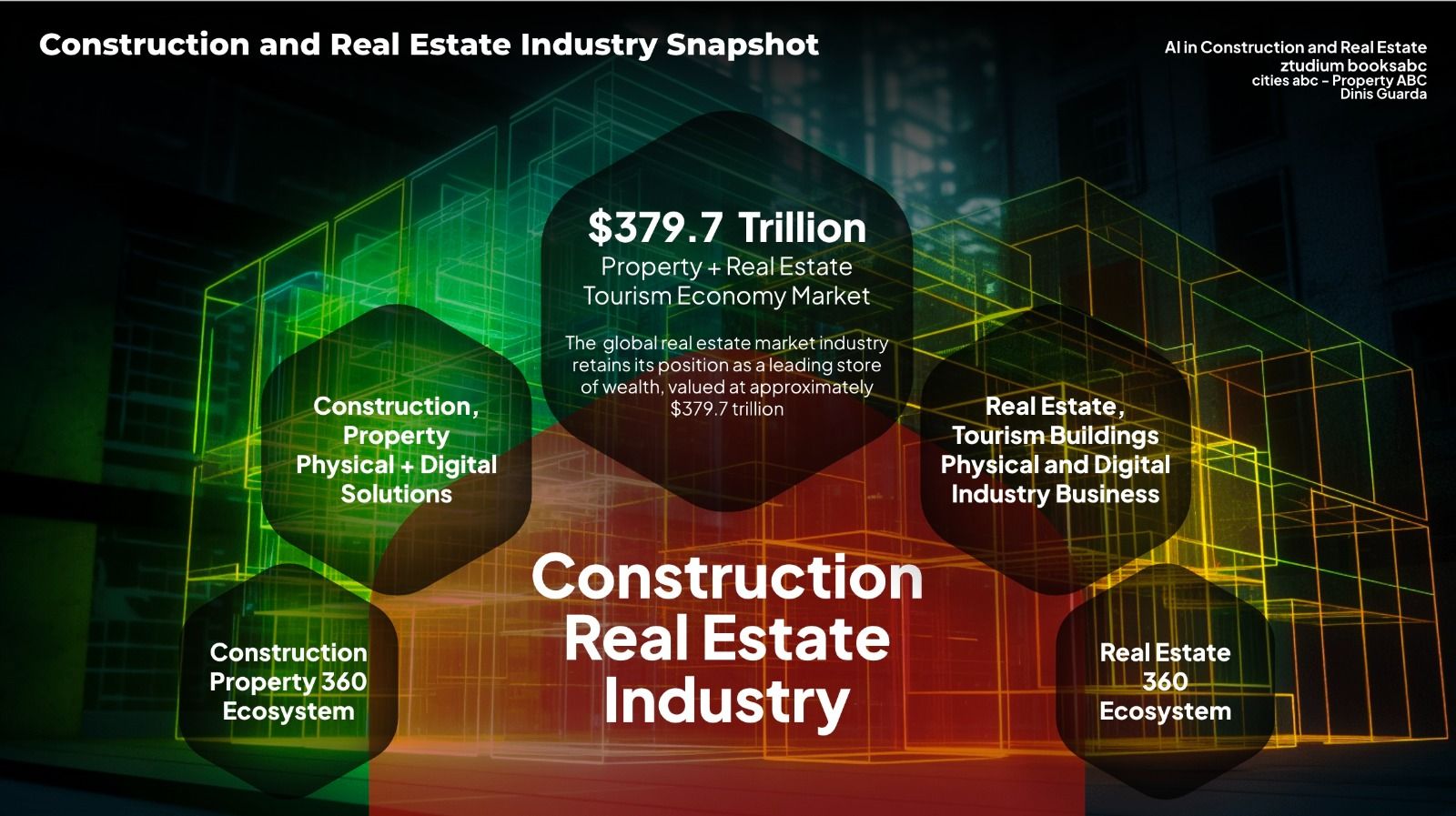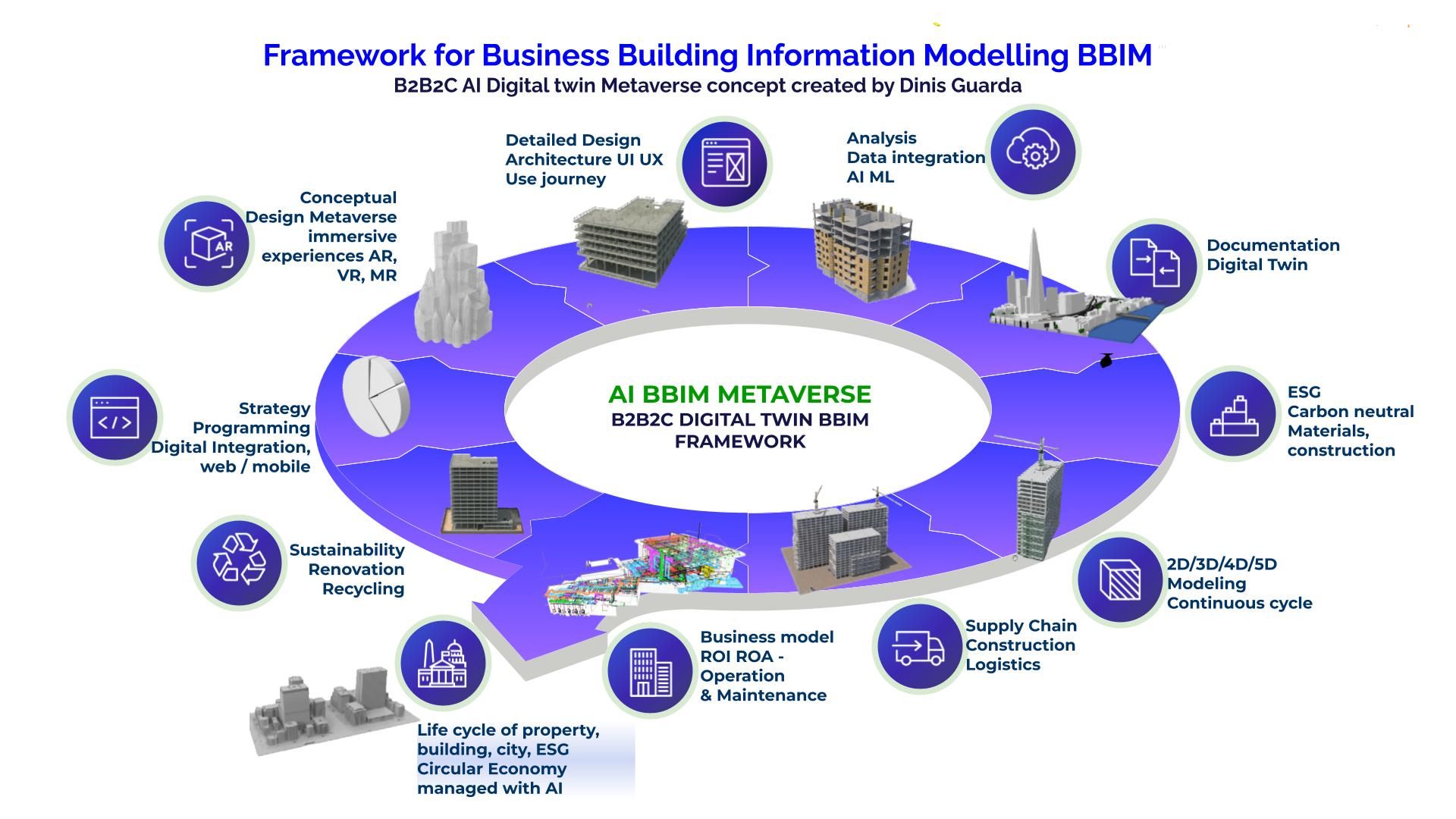business resources
AI In Construction And Real Estate, A Book By Dinis Guarda, Disrupting The $379 Trillion Industry
6 Nov 2024, 5:27 pm GMT
A book research publication by Dinis Guarda, published by Ztudium Booksabc and Constructionabc, powered by proprietary AI.DNA technology, and Businessabc and Citiesabc, and Foreword by The Lord David Evans of Watford, British publisher, entrepreneur and philanthropist, Member of the House of Lords.
To be released at the ‘AI in Construction’ event at the House of Lords on November 22, 2024, ‘AI in Construction & Real Estate’, a part of ztudium Booksabc, is available in publication, audiobook, ebook, and website.
Booksabc is the R&D publishing division created by Dinis Guarda and managed by Ztudium dedicated to exploring the intersection of research and development, knowledge, technology, creative, sports and wellbeing industries and global impact through the world of augmented immersive books, audiobooks and edutainment MStores.
‘AI in Construction and Real Estate’ is a study that overlooks a holistic quantitative research and data collection method of work and analysis. It explores the innovative applications of artificial intelligence in the overall industry from construction, real estate, property, and infrastructure.
Author Dinis Guarda is an author, entrepreneur, founder CEO of Ztudium, Businessabc, Citiesabc, sportsabc.org, and Wisdomia.ai. Dinis is an AI leader, researcher and creator who has been building proprietary solutions based on technologies like digital twins, 3D, spatial computing, AR/VR/MR. He is ranked as one of the most influential people and thought leaders in Thinkers360 / Rise Global’s The Artificial Intelligence Power 100, Top 10 Thought leaders in AI, smart cities, metaverse, blockchain, fintech.
“The advent of artificial intelligence (AI) technologies has penetrated various fields of society, and its application in the field of construction and engineering has and will bring revolutionary changes to the industry.
AI, particularly through Machine Learning, NLP, and Generative AI, possesses transformative data processing capabilities and intelligent algorithms. These capabilities enhance the efficiency and accuracy of a construction project at every stage - from physical and digital realms to architecture, engineering, planning, measurements, and cost management, injecting new solutions and igniting innovation across the field," emphasises Dinis.

‘AI in Construction & Real Estate’ provides actionable steps, such as setting clear AI goals, building data infrastructure, selecting appropriate AI tools (e.g., machine learning, computer vision), addressing cybersecurity, fostering collaboration between AI and industry experts, and investing in training.
With a focus on continuous improvement and sustainability, it empowers leaders to drive innovation, meet regulatory goals, and optimise performance across construction processes.
‘AI in Construction & Real Estate’: Relevance in current markets
The construction, infrastructure, real estate, and property sectors are among the largest and most influential industries globally, covering essential areas such as residential, commercial, and industrial development.
The sector industries contribute approximately 13% to the global GDP and represent critical drivers of economic growth and urbanisation. However, the industry is on the brink of a profound evolution, spurred by AI and Fourth Industrial Revolution (4IR) technologies.
The application and assistance of artificial intelligence in construction and real estate has and will have a major impact. From construction, real estate, architecture and property costs, as well as the present and future prospects and business and corporate business and trends, AI in Construction will transform the entire industry 360.
As of 2023, the global construction market is projected to grow from approximately $15.19 trillion to nearly $15.97 trillion by 2024, a steady demand driven by urbanisation, infrastructure development, and population growth.
Meanwhile, the combined global real estate and infrastructure market, encompassing residential, commercial, and industrial assets, was valued at $365.51 trillion in 2023, with projections estimating it to reach approximately $379.03 trillion in 2024.

‘AI in Construction and Real Estate’ highlights that AI applications are now central to managing construction sites, predicting maintenance needs, and even supporting design processes. Citing the fact that smart cities market volume is anticipated to reach US$115.30bn by 2029, the books emphasises that AI plays a pivotal role in sustainability, where companies can measure their carbon footprint, optimise energy consumption, and manage waste, aligning with ESG (Environmental, Social, and Governance) goals using AI-driven analytics.
Related Content:
AI in Construction and Real Estate: The research publication book
The book research publication by ztudium Booksabc and Constructionabc, is powered by its proprietary AI.DNA technologies.
AI.DNA is a multidisciplinary R&D artificial intelligence global interdisciplinary Labs that offers AI.DNA Labs - AI R&D + GPU Data Center, empowering global platforms like Businessabc.net, Citiesabc.com, Sportsabc.org, LegalABC, Constructionabc, Smart cities DNA. AI.DNA Lab offers state-of-the-art solutions and integrating LLMs Data GPUs cutting edge solutions that serve and empower any business, government, organisations.
Construction, engineering processes, budgets, and costs are important foundations in any construction project, involving complex legal, financial, regulatory, data processing, precise cost prediction and control, and effective risk management.
‘AI in Construction and Real Estate’ highlights the use of a 3D simulation model within a 3D metaverse to mitigate these risks. The book emphasises that this simulation allows participants to accelerate, slow down, or pause the construction simulation, enabling them to observe the effects of different construction decisions on the project.
“‘AI in Construction and Real Estate’ goes on defining how the application of AI, BIM, Data, digital twins, Blockchain in construction, are now revolutionising the entire construction, real estate, property industry. It covers both theoretical insights and practical applications, and also highlights the real-world case studies that illustrate AI’s transformative power in these industries”, Dinis elaborates.

The book is divided into three comprehensive sections:
- Part 1: Analyses the current state of the industry, its scale, and the importance of digital transformation.
- Part 2: Highlights the latest advancements in technology, including BIM, digital twins, and blockchain smart contracts.
- Part 3: Outlines practical, actionable strategies for adopting AI, setting AI-driven goals, building data infrastructure, addressing cybersecurity, and fostering collaboration.
The book emphasises real-world applications and case studies, offering insights into how AI is already being used to predict and manage incidents, enhance safety, streamline property transactions, and contribute to sustainable construction practices.
‘AI in Construction & Real Estate' also addresses how AI can be used to predict and manage incidents, earthquakes, natural disasters in construction and real estate. The ‘AI in Construction and Real Estate’ is a research and graphic publication that addresses the challenges of AI adoption, reskilling and training, data security, and the ethical considerations, providing a balanced outlook on the future of AI in construction and real estate.
AI, digital twin technology, blockchain, BBIM, and IoT integration in construction and real estate
AI technologies such as predictive analytics, machine learning, and generative design have begun revolutionising construction and real estate by enhancing operational efficiency and precision. The global digital twin market, for instance, is projected to expand from $10 billion in 2023 to over $110 billion by 2028.

Digital twins facilitate the creation of real-time 3D models that support proactive project management and seamless adjustments, merging physical and digital realms into a cohesive operational framework.
McKinsey research highlights the benefits of adopting Building Information Modelling (BIM), revealing that it can boost project delivery speed by up to 30%. Building on this, ‘AI in Construction and Real Estate’ introduces the concept of Business Building Information Modelling (BBIM), which integrates financial, operational, and strategic business data into traditional BIM systems. This approach empowers decision-makers to leverage technical data for informed, cross-departmental strategy.

“Business Building Information Modelling (BBIM) extends the capabilities of traditional Building Information Modelling (BIM) by incorporating business objectives directly into the modelling process. While conventional BIM primarily focuses on design, construction, and engineering aspects, BBIM seeks to bridge the gap between technical data and organisational strategy. By integrating insights from finance, operations, and executive management, BBIM enhances the usability of BIM data for decision-makers across various departments.
Calling all developers, architects, real estate investors, and data scientists! Get ready to explore ‘AI in Construction & Real Estate,’ an eye-opening journey packed with invaluable insights into cutting-edge tools and strategies transforming the industry. Discover how you can unlock greater efficiency, boost profitability, and embrace innovative practices for a brighter future,” says Dilip Pungliya, Partner and Board Member of Ztudium Group, researcher and AI scientist, and contributor to ‘AI in Construction and Real Estate’.
AI in construction: ESG, smart cities, and disaster management
While ‘AI in Construction and Real Estate’ celebrates the capabilities of AI, it also addresses the challenges that come with adopting these technologies. Issues like data security, ethical AI use, and the need for reskilling and training are explored to provide a balanced perspective. The book argues for a structured approach to AI implementation, ensuring that technological advancements align with human values and organisational objectives.

“The 2022 UNEP Global Status Report indicates that the buildings and construction sector accounted for 37% of energy-related CO2 emissions in 2021. There is, therefore, an urgent need for innovative solutions to enhance efficiency and sustainability.
‘AI in Construction and Real Estate’ is a blueprint for embracing technological advancements that are reshaping the industry. This book explores how AI-driven tools, from machine learning to digital twins, are transforming project management, safety, and sustainability efforts across the construction lifecycle,” explains Dinis.
How is AI reshaping the future of construction and real estate industry?
Dinis Guarda reflects: “AI is not just an addition to the industry; it is a fundamental change that challenges us to rethink how we build, manage, and sustain our environments. This book is a call to action for industry leaders to harness AI’s potential while being mindful of its ethical and societal impacts."
Share this
Pallavi Singal
Editor
Pallavi Singal is the Vice President of Content at ztudium, where she leads innovative content strategies and oversees the development of high-impact editorial initiatives. With a strong background in digital media and a passion for storytelling, Pallavi plays a pivotal role in scaling the content operations for ztudium's platforms, including Businessabc, Citiesabc, and IntelligentHQ, Wisdomia.ai, MStores, and many others. Her expertise spans content creation, SEO, and digital marketing, driving engagement and growth across multiple channels. Pallavi's work is characterised by a keen insight into emerging trends in business, technologies like AI, blockchain, metaverse and others, and society, making her a trusted voice in the industry.
previous
Tech-Driven Strategies for Building Mobile Apps That Stand Out
next
How to Customize Your Employee Onboarding Process for Different Roles